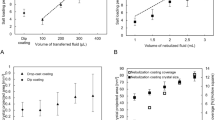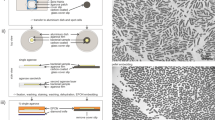Abstract
DURING an investigation into the fate of Pasteurella pseudotuberculosis injected into the peritoneal cavities of mice and guinea-pigs, difficulty was met in obtaining leucocytes from the peritoneal surfaces of the mouse. From guinea-pigs satisfactory preparations of leucocytes were obtained by pressing clean microscope slides against the visceral surface of the peritoneal wall. These slides were then fixed by heat and stained with Leishman's stain in a similar manner to blood smears. This method proved unsatisfactory with mice even if prior injection with starch was used to produce a leucocyte exudate.
This is a preview of subscription content, access via your institution
Access options
Subscribe to this journal
Receive 51 print issues and online access
$199.00 per year
only $3.90 per issue
Buy this article
- Purchase on Springer Link
- Instant access to full article PDF
Prices may be subject to local taxes which are calculated during checkout
Similar content being viewed by others
Author information
Authors and Affiliations
Rights and permissions
About this article
Cite this article
PRICE, P., RANDLES, W. A Method for obtaining Cell Monolayers from Tissue Surfaces using Membrane Filter. Nature 205, 1134–1135 (1965). https://doi.org/10.1038/2051134a0
Issue Date:
DOI: https://doi.org/10.1038/2051134a0
Comments
By submitting a comment you agree to abide by our Terms and Community Guidelines. If you find something abusive or that does not comply with our terms or guidelines please flag it as inappropriate.



